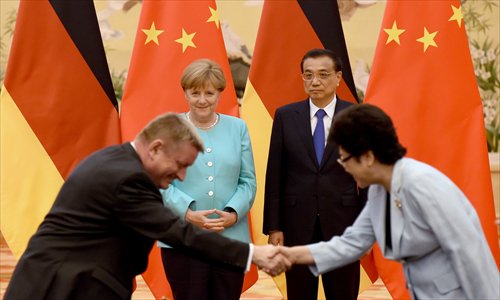Beijing rejects EU trade war
China, Germany sign $15 billion in business deals

Chinese Premier Li Keqiang (second from right) and German Chancellor Angela Merkel witness a signing ceremony at the Great Hall of the People in Beijing on Monday. A total of 96 contracts worth $15 billion were signed on Monday between Chinese and German companies. Photo: AFP
China believes no one benefits from a trade war, Premier Li Keqiang said Monday during the fourth round of China-Germany inter-governmental consultations, which was followed by the signing of $15 billion in business deals.
"China has already fulfilled its obligations on joining the World Trade Organization (WTO). What's needed now is for the other parties to fulfill the matching obligations they had promised," Li said.
German Chancellor Angela Merkel previously said she favors granting China market economy status at the WTO as stipulated in the 2001 protocol. "We can find a solution on what was promised 15 years ago," she said Monday.
European commissioners are expected to debate China's status in late June or July, at a time of heightened trade tensions after global rivals accused China of dumping cheap steel exports following a slowdown in domestic demand, Reuters reported.
A total of 96 contracts worth $15 billion were signed on Monday between Chinese and German companies at the eighth Chinese-German Forum for Economic and Technological Cooperation in Beijing.
There is great room for cooperation between our two countries as both upgrade their economic structures, said Lin Nianxiu, deputy director of the National Development and Reform Commission (NDRC), the country's top economic planning body.
Politicized status
"Granting China MES will be a win-win choice for both China and the EU as it will help expand bilateral trade," Wu Yikang, director of the European Studies Center at the Shanghai Academy of Social Sciences, told the Global Times on Monday.
According to the WTO's accession protocol, China will automatically be granted MES by December 2016.
However, "the issue of granting MES to China has been to some extent over-politicized in Europe," Wu noted, adding that a few countries and companies also worried they might suffer economically from a lack of competitiveness.
In May, the European Parliament said in a non-binding resolution that Chinese exports should be treated in a "non-standard way" as China had failed to meet the five EU criteria that define a market economy, Xinhua reported.
During a meeting with German Foreign Minister Frank-Walter Steinmeier on Monday in Beijing, Chinese State Councilor Yang Jiechi called on the EU to stop basing its anti-dumping investigations of Chinese goods on the "surrogate country system," under which production costs in a third country are used in an EU anti-dumping investigation to calculate the value of products from economies the EU has not granted MES to, such as China.
Fusing strategies
Merkel is traveling with six ministers and a large business delegation, including the CEOs of several industrial giants such as Volkswagen, BMW, Siemens and Airbus.
Li and Merkel also presided over the signing of a framework agreement between Daimler AG and BAIC Motors, under which the two companies agreed to invest an additional 4 billion yuan ($600 million) for the expansion of an engine plant in Beijing, news portal qq.com reported.
The business deals signed on Monday included an agreement between Airbus' German helicopter unit and China Aviation Supplies Holding Company, Bloomberg reported.
The two countries attached great importance to the docking of their national strategies, namely China's "Made In China 2025" blueprint and Germany's "Industrial 4.0" strategy," analysts said.
"Germany needs China's market while China wants German technology," Cui Hongjian, director of the Department of EU Studies at the China Institute of International Studies, told the Global Times, noting that what Merkel has adopted is a pragmatic policy.
On Sunday, Merkel also told reporters after meeting with Li that the two countries have agreed to establish an "early warning system" to avoid problems for German NGOs from a Chinese law adopted in April to regulate overseas NGOs' operations in the Chinese mainland, Reuters reported.
Taking effect on January 1, 2017, the law has triggered concerns at home and abroad over police supervision over such organizations.
Joint statement
A joint statement issued by the two countries said territorial disputes and maritime interests issues shall be addressed in a peaceful manner, based on international law, regional consensus and bilateral agreements.
The two sides also agree to enhance cooperation in the fight against cyber security and to protect intellectual property rights.
China appreciates that Germany has become an important contributor to the Asian Infrastructure Investment Bank, the statement reads.
Expressing willingness to deepen cooperation in investments and financing, Germany appreciates that China has become a member of the European Bank for Reconstruction and Development, it says.
Reuters and Xinhua contributed to this story